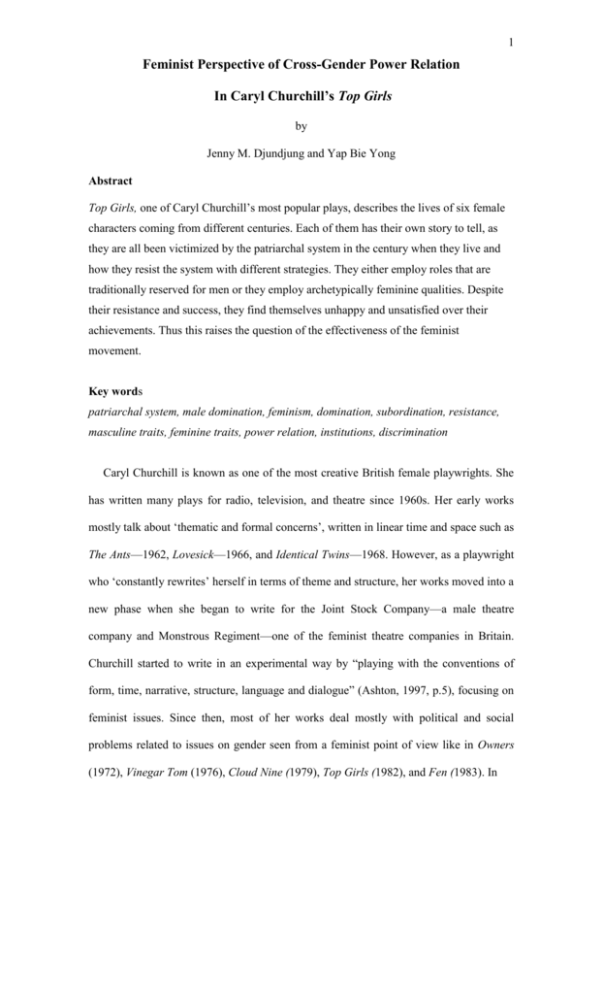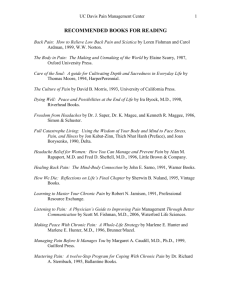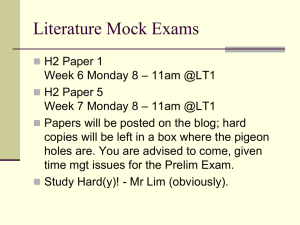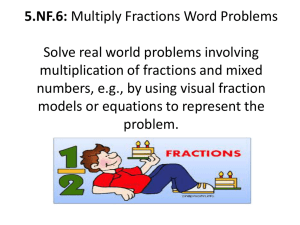Top Girls - Faculty e
advertisement

1 Feminist Perspective of Cross-Gender Power Relation In Caryl Churchill’s Top Girls by Jenny M. Djundjung and Yap Bie Yong Abstract Top Girls, one of Caryl Churchill’s most popular plays, describes the lives of six female characters coming from different centuries. Each of them has their own story to tell, as they are all been victimized by the patriarchal system in the century when they live and how they resist the system with different strategies. They either employ roles that are traditionally reserved for men or they employ archetypically feminine qualities. Despite their resistance and success, they find themselves unhappy and unsatisfied over their achievements. Thus this raises the question of the effectiveness of the feminist movement. Key words patriarchal system, male domination, feminism, domination, subordination, resistance, masculine traits, feminine traits, power relation, institutions, discrimination Caryl Churchill is known as one of the most creative British female playwrights. She has written many plays for radio, television, and theatre since 1960s. Her early works mostly talk about ‘thematic and formal concerns’, written in linear time and space such as The Ants—1962, Lovesick—1966, and Identical Twins—1968. However, as a playwright who ‘constantly rewrites’ herself in terms of theme and structure, her works moved into a new phase when she began to write for the Joint Stock Company—a male theatre company and Monstrous Regiment—one of the feminist theatre companies in Britain. Churchill started to write in an experimental way by “playing with the conventions of form, time, narrative, structure, language and dialogue” (Ashton, 1997, p.5), focusing on feminist issues. Since then, most of her works deal mostly with political and social problems related to issues on gender seen from a feminist point of view like in Owners (1972), Vinegar Tom (1976), Cloud Nine (1979), Top Girls (1982), and Fen (1983). In 2 these works, she criticized the institutionalized gender identities, gender roles and sexuality under the dominant ideology, which put women in a marginalized position so that they are always politically disadvantaged and victimized. Because of her deep concern on these feminist issues, many feminists of different school of thoughts claim her as their representative. The claim that she is a feminist was acknowledged by Churchill when she was asked about her writing and feminism. For years and years I thought of myself as a writer before I thought of myself as a woman, but recently I’ve found that I would say I was a feminist writer as opposed to other people saying I was. I’ve found that as I go out more into the world and get into situations which involve women what I feel is quite strongly a feminist position and that inevitably comes into what I write. (Ashton, 1977, p.18) For Churchill, writing from a feminist point of view is something that comes to her naturally as a woman writer. Her concern over problems and situations that women everywhere for centuries have to face in the world where male bias is as strongly as ever, has put Churchill in the position of giving women chances to voice their opinions and feelings over their situations in the characters of her plays. Churchill also plays with the dramatic conventions to crystallize her points and concerns. She uses gender rolereversal in Owners; she combines seventeenth-century setting with contemporary songs in Vinegar Tom; she utilizes cross-gender and cross-racial casting, cross-dressing, and double roles in Cloud Nine and she “defies the logic of historical chronological, and spatial representation” (Ashton, 1977, p. 38) in Top Girls which effectively communicate her view on the issues discussed in the plays. Amongst her feminist plays, Top Girls is considered as one of Churchill’s most popular ones. It has all-female casts and it explores many aspects of women’s lives across the centuries. In this play, Churchill makes several experiments on the structure and the 3 dialogues. The unique structure of Top Girls violates the linear structure and breaks the chronological order of time setting and place and it uses overlapping and continuous dialogues. The deconstruction is shown clearly in the way Churchill arranges the acts and scenes as seen in the opening scene of the play where six female characters from different time and place, historical and imaginary, gather together to celebrate Marlene’s success in her promotion as a managing director. The purpose of breaking the linear structure is to gather the six characters and project the situation faced by each of the characters in their ways of surviving inside a system, which is dominantly patriarchal. The function of the six characters’ personal experiences “symbolize the exploitation of women throughout the ages, providing the perspective for evaluating the contemporary model of success in Marlene” (Innes, 1992, p. 465). The six characters attending the dinner in the opening scene are Marlene, Pope Joan, Isabella Bird, Lady Nijo, Dull Gret, and Patient Griselda. Except for Dull Gret, they can fall into two categories, they become famous because they take the roles, which are traditionally reserved, for men – like Isabella Bird the Victorian traveler, Pope Joan and Marlene. Or they embody archetypal feminine qualities like Lady Nijo, a Japanese courtesan and Griselda who is celebrated for her patience (Innes, 1992, p. 465) All of these characters have several similarities in a sense that they all have experiences dealing with the misery of living in a patriarchal society and are victimized by the system despite their effort to defeat the system. All of them have tried to beat the system either by adopting what are considered to be masculine or feminine traits, yet all of them are either trapped in the social construction of feminine traits or betrayed by their own bodies which have the capability to have children. The main character, Marlene, was born into a working class family where domestic violence was a routine. She grew up and witnessing her mother constantly being abused by her father without the least desire to defend herself or to retaliate against such mistreatment. Marlene mother’s passive acceptance of the abuse, suggests that she 4 considers such treatment as natural and common which further encourages her husband to continue with his abuse. Marlene finds her mother’s passivity in accepting her ‘fate’ to be so offensive that it has left a deep mark in Marlene’s mind and she is determined not to let herself in her mother’s helpless, weak and submissive position. JOYCE. You said Mother had a wasted life. MARLENE. Yes I do. Married to that bastard. . . . I don’t want to talk about him. JOYCE. You started, I was talking about her. She had a rotten life because she had nothing. She went hungry. MARLENE. She was hungry because he drank the money./ He used to hit her. . . . She didn’t hit him. . . . I had to get out, . . . I knew when I was thirteen, out of their house, out of them, never let that happen to me,/ never let him, make my own way, out (Churchill, 1990, p. 138-9). Marlene sees her father as representing men in general while domesticity does not suit her at all, as she does not intent to be in a position where she has to be submissive to a man. Thus, since she was thirteen, Marlene has taught herself to find ways to escape her fate as a working class woman, because she “hate[s] the working class” (Churchill, p.139) and their ways of living which she finds offensive. At the same time, however, even though she hates her abusive father, she finds power and control to be desirable, that her leaving her house since she was thirteen is the form of control and power she exercise to determine her future. She resists the male power and control in the family, her father’s, and the society’s power and control over her class position, by running away from all that bind her to the will of others. Despite her efforts, she needs men to fulfill her biological needs that she has a lover and her body betrays her when she finds herself pregnant at the age of seventeen. It seems unavoidable that she has to get married and settle down like the other girls of her class, or 5 like her sister, Joyce, who is married but childless. But once again, Marlene is able to escape the trap of marriage by giving away her child to her sister. JOYCE. . . . You said you weren’t keeping it. You . . . shouldn’t have had it / if you wasn’t going to keep it. . . . You was the most stupid,/ for someone so clever you was the most stupid, get yourself pregnant, not go to the doctor, not tell. MARLENE. You wanted it, you said you were glad, I remember the day, you said I’m glad you never got rid of it, I’ll look after it . . . . JOYCE. You said I got her off you / when you didn’t – MARLENE. I said you were lucky / the way it – JOYCE. Have a child now if you want one. You’re not old. MARLENE. I might do. . . . I’ve been on the pill so long / I’m probably sterile. (p.134 -5) For the young Marlene, her pregnancy is a leap backward, because her pregnancy threatens the realization of her future plans and puts her on the brink of repeating her mother’s story. Moreover, the baby is certainly a burden, it will tie her down to domesticity and she cannot afford to have a baby if she wants to pursue her ambition as a career woman. In some way, her decision to be a successful unmarried career woman is the manifestation of her effort to escape what is considered to be the traditional trap in the form of the marriage institution, where male domination reigns. Joyce’s calling her stupid might clearly describe Marlene’s feeling when she found herself pregnant. The only way out for young Marlene at that time was ‘to get rid of it somehow’. But for the successful Marlene who has gone to defeat the world, she feels regret over what she has gone through. The longing she feels to have a child is detected by Joyce when she tells Marlene to have a child again. Marlene might also feel a bit of guilt that she has given her baby away and not taken care of it when it is hers and her responsibility so that she offers to take Angie, her child, back if Joyce does not want Angie. Despite her 6 determination to be independent, successful and in control, Marlene cannot escape the trap of ‘the myth of maternal instinct’, a concept which believes that “the nurturing behaviors of mother toward their children are determined by biological factors” (Brannon, 1996, p. 200). This myth has been instilled in her that as a woman who has given birth to a child, she should feel maternal and her not having it might be considered as her being unnatural and a freak. And she has been accused of this by Mrs. Kidd, the wife of the man Marlene has defeated for her managing position, when she says, “ You’re one of these ballbreakers / that’s what you are. You’ll end up . . . miserable and lonely. You’re not natural” (p. 113). The accusation seems to affects Marlene than what she is willing to admit. She has the fear she might end up like what Mrs. Kidd has predicted; therefore, her offer to take her daughter is a kind of remedy for being ‘unnatural’ and to start by being ‘natural’. Her offer to take her daughter back, then, does not mean that she has developed the instinct, but because she feels that it is only natural for her to possess the instinct. Marlene seems to realize that she is carried away by her feeling when she reveals to Joyce that she really does not want a child. MARLENE. I’ve had two abortions, are you interested? Shall I tell you about them? Well I won’t, it’s boring, it wasn’t a problem. I don’t like messy talk about blood / and what a bad . . . time we all had. I don’t want a baby. I don’t want to talk about gynaecology (p.135). Her outburst about her real feeling about a baby also reveals how she hates getting pregnant and has to abort it. This is not only about the baby, but more of her protest against the unfairness of the whole system, which puts the woman in the ‘messy’ business after a sexual relationship. Women have to bear the consequence of a sexual relationship by getting pregnant, whereas men do not have to deal with it. Women also have to deal with guilt and regret whereas men are free from these feelings. Marlene’s protest can be interpreted as a cry of protest against the creation of a woman’s body, which she feels to 7 be a weakness for women in general; yet, it is something that she cannot run away from. In a sense then, even nature seems to take side with men. If Marlene consciously gives up her baby because she knows that a baby would mean a barrier to her career, Joan’s case is different. Living in the ninth century, an age where women were considered as second-class citizens, Joan finds her rights to get education denied by the dominant patriarchal system at that time which is represented by the Church. Longing for knowledge and education, Joan decided to disguise herself as a man and entered the Church, which enabled her to occupy the top position in the system when she became a cardinal and then the Pope. By becoming a Pope, Joan has successfully defeated the system because the patriarchal system that has discriminated against her sex, gives her power to control over the male sex. As a Pope, she also has the power to change the truth, as what she has revealed to Marlene. JOAN. I had thought the Pope would know everything. I thought God would speak to me directly. But of course he knew I was a woman. . . . And I realised I did know the truth. Because whatever the Pope says, that's true. . . Yes, I enjoyed being Pope. I consecrated bishops and let people kiss my feet. I received the King of England when he came to submit to the church. Unfortunately there were earthquakes, and some village reported it had drained blood, and in France there was a plague of giant grasshoppers, but I don't think that can have been my fault, do you? . . . The grasshoppers fell on the English Channel and were washed up on shore and their bodies rotted and poisoned the air and everyone in those parts died (p. 68-9). In a sense, Joan is able to defeat the system by totally immersing in the system and becomes part of it. Her exposure that the truth is actually from the Pope himself as a man and not from God, has the power to deconstruct the belief at that time which regarded the Pope as the embodiment of Christ on earth. Joan suspects that the Pope does not really have divine power, because as the Pope, Joan has never had the experience of God 8 talking to her. Yet, it becomes merely her suspicion as she is also wondering that it is because God knows that she is a woman who is not supposed to be in that position that He refuses to talk to her. Yet, Joan tends to believe more in the later suspicion when she connects the natural disaster that happened during her being the Pope to her trickery as a woman who dared to deceive the patriarchal system of the church. It is as if even nature protested against her being a pope as it is not natural for a woman to be in the position. Therefore, it can be assumed that the Church, an institution that is believed to be the most sacred and indiscriminating, is actually a fraud constructed to benefit men and to conserve male domination. Whether or not male domination is natural, is a question even Joan cannot answer, but as the product of her age, she has been implanted with the belief of the inferiority of her sex and the superiority of the male sex that she keeps wondering if nature meant it to be so that the natural disasters that might be just a coincidence, are related to her being 'unnatural'. Her success was put in jeopardy when she got pregnant with one of her chamberlains. Having disguised as a man since she was twelve and lived in an environment full of men, Joan had a very minimal knowledge about her body and her capacity as a woman. She decided to ignore her pregnancy simply because she did not realize her being able to bear a child, thinking that she was just getting fat because of the luxurious life she has as a pope. The result of that ignorance was fatal to Joan. MARLENE. Didn't you think of getting rid of it? JOAN. Wouldn't that be a worse sin than having it? / But a Pope with a child was about as bad as possible. . . . But I wouldn't know how to get rid of it. MARLENE. Other Popes had children surely. JOAN. They didn't give birth to them. NIJO. Well you were a woman. JOAN. Exactly and I shouldn't have been a woman. Women, children and lunatics can't be Pope. . . . And the baby just slid out onto the road. . . . They took me by the feet and dragged me out of town and stoned me to death (p. 69-71). 9 Like Marlene, as a woman, Joan is also the one who has to bear the consequences of the sexual relationship she has with one of her chamberlains. Her ignorance that she is actually pregnant, even though seems illogical, indicates how a woman is punished because of her ignorance, yet a man can get away freely. That popes can have children as long as they do not give birth to them is another form of discrimination against the female sex. It is as if the physical form of a woman becomes the cause of her being inferior to a man, as her body will bear the mark of her actions that she is liable for social punishment. That a man does not bear the mark has freed him from social judgments, thus he is blameless, which puts him in a superior position. Joan's regret of being a woman is her protest against the injustice done to her and her own sex simply because of her physical form, so that she says, “if it hadn’t been for the baby I expect I’d have lived to an old age like Theodora of Alexandria, who lived as a monk.” (p.69). That statement discloses how a baby has sealed her tragic fate. Joan and Griselda are in two opposite poles. If Joan adopts the male role to the extreme, Griselda embraces the archetypal feminine quality that is, being patience to the utmost. Griselda is a character from the thirteenth century literature, and Marlene’s introduction states that “Griselda’s in Boccaccio and Petrach and Chaucer because of her extraordinary marriage . . .. Griselda’s life is like a fairy-story, except it starts with marrying the prince” (p. 74). This brief introduction discloses that Griselda has the attention of three famous male writers because of her ability to endure her marriage with extreme patience, which is considered extraordinary even for her time. She is the daughter of a poor farmer and is married to a marquis. Her being chosen as the marquis’s wife, is a blessing that she cannot refuse, as she is bestowed with wealth and a higher status. GRISELDA. . . . And he came and spoke to my father. . . . My father could hardy speak. The Marquis said it wasn’t an order, I could say no, but if I said yes I must always obey him in everything. 10 MARLENE. That’s when you should have suspected. GRISELDA. But of course a wife must obey her husband. / And of course I must obey the Marquis. I’d rather obey the Marquis than a boy from the village. (p. 17) Griselda’s acceptance of the proposal is not purely because of her obedience since she is also calculating the benefit of marrying a wealthy man with a status rather than a poor man. She thinks that she has to get married anyway and has to obey her husband as much. The Marquis’ request for a complete obedience is more proper for a subordinate rather than for a wife, but Griselda’s total acceptance of the request, exposes how it is considered to be naturally a man’s rights to do so. Even though she is going to be his wife, her status would never be equal to his; not only because of her social status, but also because of her status as a woman. For Griselda, total obedience is her expression of love as she says; “Walter found it hard to believe I loved him. He couldn’t believe I would always obey him. He had to prove it” (p. 76). As Griselda is the product of her age, she accepts without questioning the myth that a good woman should obey her husband in anyway as the proof of her love and loyalty to him. She has never questioned that it does not work the other way round. As a proof of her love, thus a total obedience, Griselda lets Walter take her six-week-old baby girl away from her without so much of a protest because “It was Walter’s child to do what he liked with . . .. I had promised . . .. He wanted to see if I loved him enough” (p. 77). She also does not protest when Walter takes away her second child, a two-yearold boy. The children, considered to be the most precious things for a mother, can be used as a tool to show male superiority, showing that they are less important than the man of the family. He can do whatever he wants with his wife and children since they are his possession to keep or to discard. The third test is when Walter sent Griselda home wearing only a slip, because he wants to marry a girl from the aristocracy and later asks her to prepare for the wedding. Griselda passes all the tests as she always obeys and never criticizes or protests the injustice done to her. In a way, a woman like Griselda has helped 11 to maintain the existence of the patriarchal system, as she is a willing participant. The lack of responses from Griselda over her husband’s domination can have multi interpretation; as a pessimistic response toward the uselessness of fighting for her rights because the system is too strong for her, as an acceptance for what she considers to be the nature of things, as her lack of motherly love toward her children or as her resistance over the domination by not responding to the provocation. When Griselda has patiently passed all the tests, she is well rewarded. GRISELDA. . . .And he stayed behind and put his arms round me and kissed me. / I felt half asleep with shock . MARLENE. And he said, ‘This is your daughter and your son.’ GRISELDA. Yes. . . . Well I fainted. Then I cried and kissed the children. . . . Of course, I loved them. . . (p. 79) Griselda was also clothed in cloth of gold as a reward for her obedience. One can see here that Griselda is treated more like an object whose feeling is of no importance. That she is rewarded for her submissiveness is the way in which the patriarchal system maintains its power by declaring women’s submissiveness as a desirable and virtuous trait and legalizing male domination in a marriage. In another sense, Griselda’s reward for her obedience can be seen as her triumph in her effort to resist the power that tries to break her down, that she remains strong until she gets all that is precious to her, even though she has to pay the price by sacrificing her children, by enduring psychological battering and personal deprivation. Thus, a marriage institution becomes the place where male power governs, but it is not unchallenged. It is also contested by the power of feminine submissiveness. What happens to Griselda, also happens to Lady Nijo, the Japanese courtesan of the thirteenth century. She was born in Japan’s Kamakura period—a religious period in Japan when Buddhism and Zen were flourishing. She is Griselda’s counterpart of the eastern version of female oppression, and she is an object owned by her master, the Emperor, like Griselda who is owned by the Marquis; whose wills are orders that cannot be refused. 12 They both have their fathers’ consent to serve their masters. Lady Nijo was brought up and trained to serve the Emperor as a courtesan at the age of fourteen. NIJO. . . . So when the time came I did nothing but cry. My thin gown were badly ripped . . . . MARLENE. Are you saying he raped you? NIJO. . . . No, of course not, Marlene, I belonged to him, it was what I was brought for from a baby. I soon found I was sad if he stayed away. It was depressing day after day not knowing when he would come. I never enjoyed taking other women to him. . . . my father was a very religious man. Just before he died he said to me, ‘Serve His Majesty, be respectful, if you lose his favour enter holy orders’ (p. 56-7). She has no choice but to be what she has been brought up to do even though it is against her will. Nijo’s response to the rape shows how male domination is unchallenged so that even when the woman has been victimized, she regards it as something as it is supposed to be. She also has to try hard to gain the Emperor’s favor, because there would be no future for her outside the court and she has to be either able to survive in the court full of other courtesans to maintain her position or else she a nun that she says, “there was nothing in my life, nothing, without the Emperor’s favour” (p. 66) The society in which Lady Nijo lives in is very patriarchal as her life and future are decided by her father, and then by the Emperor. Lady Nijo is oppressed by the men in her life and she is not aware of the oppression, taking it for granted that it is the nature of the world. Unlike Griselda who chooses to remain submissive, Nijo chooses to take two lovers when she is out of the Emperor’s favour. She also cheats the Emperor as a form of retaliation against what has been done to her. NIJO. . . . My first child was His Majesty’s, which unfortunately died, but my second was Akebono’s. . . . Now His Majesty hadn’t been near me for two months so he thought I was four months pregnant when I was really six, so 13 when I reached the ninth month / I announced I was seriously ill . . . . It was only a girl but I was sorry to lose it. Then I told the emperor that the baby had miscarried because of my illness, and there you are. The danger was past (p. 70). Her fear of being found out of her deed has made her resume to trickery. Her deed reflects her acceptance of the patriarchal value, which legalizes men to have lovers and children openly without the judgment over his morality, whereas women are demanded to be pious and loyal to one man only. Nijo’s action of taking secret lovers can be interpreted as her unconscious protest against the injustice of the system, which discriminates women so that she takes the privilege reserved for men. Yet, she is also the one who bears the mark of her action since she is the one who has to give birth of her four babies, whereas a man would not have this mark. She can meet Joan’s fate if she does not deliver the babies in secrecy and eliminates all evidence of her having them. She is still be the one who has to pay, sacrificing her babies in order to save her position and her status, because an illegal baby might end her luxurious life as the Emperor’s courtesan. As she has no life outside the court, this is her attempt for survival that she has to pay highly. Her paying the price has robbed her the maternal feeling that by the time she has her fourth child, she feels nothing, “It was a boy again . . . .But oddly enough I felt nothing for him” (p.72). She has so deprived of her children that she has to suppress her maternal feeling as her defense mechanism to survive. She keeps asking Griselda about her feelings for her children as they are also taken away from her. NIJO. But did you feel anything for them? GRISELDA. What? NIJO. Did you feel anything for the children? . . . Nobody gave me back my children (p. 79). Nijo’s insistence on knowing Griselda’s feelings for her children reveals Nijo’s deep longing to have her children with her and her surprise in finding that she feels nothing 14 over her last child shows that she loves her other children so much that it hurts her. Because of the repeated denial over her own babies, she becomes numb. This is her protection from being hurt again. She is envious over Griselda who can have her children again. From these two women, one can say that because Griselda remains submissive, a desirable quality in a woman, then she is rewarded with the reconciliation with her children; but Nijo who has dared to fight the system, is punished, as she has to live alone as a nun. She has been deprived of her lovers and children because she dared to cheat like Joan. From the fates that befall these two women, one can draw the conclusion that these two literary and historical characters are created by men who have to ensure the supremacy of their position by creating characters that can show the desirable and undesirable qualities in a woman. The fifth character is Isabella Bird who Marlene introduces as the Victorian traveller. She is the daughter of a clergyman who has spent half of her life doing domestic work and charity work, taking care of the sick and needy. She does these works when her father is still alive, because under the Victorian “Cult of True Womanhood” and the “Doctrine of the Two Spheres”, a woman’s place is at home, either as a daughter, sister, wife or mother and does the domestic duty such as cooking and nursing the sick (Brannon, 1996, p. 170). Her being a ‘true woman’ of the Victorian time requires her to take care of her father, as she is motherless and unmarried. But as soon as her father dies, she finds herself free to do her desire to travel the world. Based on the Victorian rules, she should not have such mobility because her world is supposed to circle around home and family and traveling is associated with the world outside home and it is believed that only men can have the mobility to do so. The death of her father also the death of the male domination that has so far binds her to domesticity. Isabella is free from any male supremacy, which regulates what she should or should not do as a woman, so that she has the choices and the freedom to follow her desire. Yet, as a Victorian woman who has been educated that it is not natural for a woman to 15 have the activities outside the home, Isabella tries to settle down. Even though she was not interested in marriage, she reveals, “I did wish marriage had seemed more of a step. I tried very hard to cope with the drudgery of life. I was ill again . . . I always felt dull when I was stationary. / That’s why I could never stay anywhere” (p. 65, 67). Her effort to fulfill what is considered to be the natural women’s place, that is home, does not sit well with Isabella, as she constantly gets various illnesses. Therefore, as soon as her husband dies, she travels again. She also tries to repent from her ‘sin’ of leaving domesticity for the world so that she purges her sin in doing charity work. ISSABELLA. Whenever I came back to England I felt I had so much to atone for. . . . I did no good in my life. I spent years in self-gratification. So I hurled myself into committees, I nursed the people of Tobermory in the epidemic of influenza, I lectured the Young women’s Christian Association on Thrift. I talked and talked explaining how the East was corrupt and vicious. My travels must do good to someone beside myself. I wore myself out with good causes (p. 72) Instead of feeling contentment in her activity, Isabella feels herself to be selfish that she has traveled the world without worrying for domestic duties, because only men can do that. She feels guilty of breaking the Cult and the Doctrine that are constructed to ensure female inferiority. By denying them, she gets the knowledge of the outside world and the freedom to travel. She feels she has done the forbidden that from time to time she resumes her feminine role, by tying herself down in a marriage so that she could not but do her domestic duty and by doing charity work. Her sharing of her travel experience might be seen as her effort to educate other women, but at the same time it illustrates how she lets her prejudice for the east to color what she regards as reality. As this role is usually men’s, one can wonder that the construction of the Western knowledge of the East is from male perspective, which is laden with prejudices. In a sense, Isabella’s mobility and freedom are not free. She pays them with the feeling of guilt and self-denial 16 from the enjoyment of traveling by using her health and her grief for her dead husband as her justification to continue traveling, The last character is Dull Gret—the subject in Brueghel’s painting entitled Dulle Griete (Terrific Griete). She does not talk much throughout the play and offers only monosyllabic comments here and there and her longest speech is put at the end of the first act to conclude the stories of all the other five women. Despite her passivity during the conversation of the other characters, Dull Gret is the only one who openly attacks and takes revenge against all the ‘devils’ in hell that have taken away her children. She will not just sit passively regretting her fate, but is ready to take action in revenge for her lost children. GRET. . . . We’d all had family killed. My big son die on a wheel. Birds eat him. My baby, a soldier run her through with a sword. I’d had enough, I was mad, I hate the bastards. I come out of my front door that morning and shout till my neighbours come out and I said, ”Come on, we’re going where the evil come from and pay the bastards out.’ And they come out just as they was . . . . I’ve got a sword in my hand from somewhere . . . . You just keep running on and fighting / you didn’t stop for nothing. Oh we give them devils such a beating (p. 82). 17 The picture illustrates how Dull Gret fights for the devils. Her longest speech in the play besides wrapping up the other women’s stories also shows the answer to all the problems these women have. Action speaks louder than words. Taking her neighbors with her demonstrates the needs for all women who have been deprived of their rights and children to unite to fight the devils together. The devils in hell she refers to symbolize all aspects of life that have robbed women of their happiness. But she also describes that the fight will not be easy. They will face hell and they will have to continue fighting and never let anything stop them from fighting for their rights. Even though there is no promise that the fight will bring victory, there has been some revenge that women will not be taken without due consideration All these six female characters analyzed above, share several similarities. First of all, all of the characters live in a patriarchal society and all of them, consciously or unconsciously, have the awareness of their rights and they fully realize that they do not deserve to be treated badly. As a result of this awareness, all of them demonstrate resistance to win and survive the patriarchal system by using different strategies. All of them gain success in a sense that they can achieve what they want—Marlene gets a successful career, Joan becomes a pope, Griselda wins the respect from her society, both Nijo and Isabella have their freedom and Gret has her revenge. Yet, all of them have to pay a price for their success. Marlene has to pay with abortions and giving away her daughter so that she can pursue her career. Joan has to pay with her life. Nijo and Griselda have to sacrifice their children for their social status. Isabella pays with her constant feeling of guilt and Dull Gret loses all her children. Considering the price that they have to pay - a question arises on the worth of the success that they have gained. Are all of the characters satisfied with their way of struggling to get what the male definition of success? In one part of the play, Marlene speaks for all of the characters, asking one question “Oh God, why are we all so miserable?” (p.72). This question is an irony, that despite all the sacrifice, they do not feel happy or satisfied over what they have achieved. It will further question the effectiveness 18 of the women fighting for their rights, that “[c]ritics have sometimes questioned the ideological purpose of Marlene, or Top Girls in general, asking whether to read Marlene and the play as a celebration of women’s achievements or a critique of bourgeois feminism?” (Ashton, 1997, p. 40) Is Marlene a protagonist or is she an antagonist? That is why some critiques even consider this play as an anti-feminist play because of the blur ending. Churchill’s emphasis on the negative effects of the feminist movement which completely take over the men’s ways of achieving success, as they are “adopting exactly those aggressive and predatory values which have for centuries oppressed women” (Innes, 1992, p. 466). It will mean that they will create a new form of discrimination and oppression, the devils that Dull Gret has continued beating, against the other sex. However one interprets the play, the experience of these six women exemplifies how male domination in the patriarchal system has occurred since centuries ago and is supported by the most sacred institutions of the Church and flourishes in the marriage institution. Individual fights of these women will never come to any achievement, because the system is too well rooted to beat. Women should rethink and reshape their way of struggling against the patriarchal system. Eliminating the well-established patriarchal system needs more than imitating male’s roles and forgetting women’s own nature and identity.








